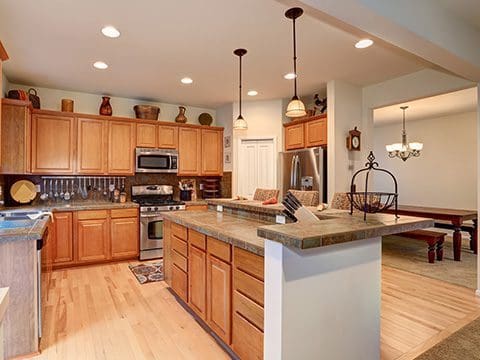The Difference Between Hardwood and Engineered Hardwood Flooring
Comparing real hardwood and engineered hardwood flooring is like comparing apples and oranges. They’re both beautiful flooring options, but they differ in their characteristics. Read on to see how we break down the differences of real hardwood vs. engineered hardwood flooring:
Composition
Hardwood: 100% real hardwood. Tends to be about 3.25’’ in width with a plank width ranging from 5-10’’.
Engineered Hardwood: Multi-layered composition. Topped with a layer of real hardwood. In terms of dimensions, engineered hardwood is about the same as real hardwood.
Durability
Hardwood: Can last up to 40 years if properly maintained. Any scratches that come about over time can simply be sanded and refinished. Hardwood flooring an last quite a while, making it a worthy investment for homeowners..
Engineered Hardwood: This material can last as long as real hardwood flooring, but only if it’s properly maintained., because it can’t be refinished as often as real hardwood. In fact, engineered hardwood can only be refinished once or twice. Therefore, there’s not as much room for error as there is with real hardwood. If your engineered hardwood flooring isn’t well-maintained, it will last about 20-30 years.
Ease of Installation
Hardwood: Since planks will need to be nailed or stpled down, profession installation will be needed. It will take time, and will require the work of professionals in order to get the job done properly.
Engineered hardwood: While installing engineered hardwood isn’t as difficult as installing real hardwood, professional installation is still recommended. Engineered hardwood can be installed using the staple-down nail-down, glue-down or lock-and-click methods. The instalation will be less time-consuming, but the difference isn’t significant.
Versatility
Hardwood: Hardwood flooring can be made of any type of wood available, so your options are basically endless! There are both casual and luxurious options to choose from.
Engineered Hardwood: Since engineered hardwood is topped with real hardwood, it’s just as versatile. Other than width-related restrictions, there’s not much holding you back!
Areas of Use
Hardwood: Hardwood is great for areas of the home that experience high foot traffic, such as living rooms and entryways. The only areas to avoid installing hardwood flooring are areas that are prone to moisture and constant spills, such as kitchens and bathrooms. Moisture penetration can damage hardwood flooring and cause it to curl and warp.
Engineered Hardwood: Engineered wood can be installed in most areas in a home, as it’s not as vulnerable to moisture as real hardwood is. The reason for this is that engineered hardwood flooring is multi-layered, which prevents moisture from seeping to the core. However, you should still excercise caution and wipe up spills as soon as they occur.
Resale Value
Hardwood: Hardwood flooring increases a home’s resale value quite a bit. Home buyers are always interested in having long-lasting amenities, so hardwood flooring will definitely be a nice touch.
Engineered Hardwood: Since it’s topped with real hardwood, engineered wood has just about the same effect on resale value as real hardwood.
Real hardwood vs. Engineered Hardwood Floor: What’s your choice?
Honestly, you can’t go wrong with either option. They both have wonderful qualities and can add value to your home.
For all your flooring needs, rely on Floors Touch! Call us at (214) 326-0100, or visit our website—https://floorstouch.com. We have a wide selection of flooring options and can even install your flooring for you! Check out our blog for more helpful home remodeling tips. You can also visit our social media for more details about engineered hardwood floor.
Do you want to know more about our home flooring solutions? Call Floors Touch of McKinney at (214) 326-0100 for more information.
